Do I Have The New Virus Going Around? Here is what you need to know about the new virus going around: One of the biggest news stories lately is the new virus- and it’s getting people worried. You’ve probably seen pictures of people in China walking around with masks, seen statistics about the latest death toll, or have heard horror stories of contamination in crowded Chinese cities.
It all makes for a real panic, and it might cause some concern in your life. However, when you understand the virus and learn about what you can do to protect yourself and your family, it’s clear that this is something that with proper precautions, you will likely be just fine.
*This post includes my Amazon affiliate links
What You Need To Know About The New Virus
Do I Have The New Virus Going Around? The new virus actually comes from a family of viruses, and it’s recognized under a microscope by its “corona” or crown shape. It has been tracked down to an outbreak in a village in China where humans come in close contact with animals (likely from a market handling animal parts).
Most of the cases reported (save for a relative handful in other countries around the world) come straight from the same province in China where it all started. The good news is that there are relatively few cases so far in the United States, with most of them stemming from a cruise ship disembarkation where several people were infected.
Do I Have The New Virus Going Around?
Oddly enough, you’ve probably had strains of the new virus in the past; it just so happens that this strain is far stronger than what has previously been seen. So, this isn’t new it’s just stronger.
Of those infected, about 2-3% have died, which places it as a real threat, though it’s one that is only dangerous for a select group of people. If you are already a strong, healthy individual, you’ll probably be fine, even if you do end up contracting the virus. Most healthy people have the right natural defenses in their bodies to fight off this virus.
Those that are most at risk are young babies, the elderly, those with weak immune systems, and those with respiratory issues. That means that, if you or someone you know falls into the “risk” category, you should carefully go forward and make some easy choices that can protect you or them from infection.

How Can I Prevent Getting Sick?
It’s also worth noting that cleanliness standards are very different in China than they are in the United States. In the US, it’s not uncommon to find countless stations for hand sanitizer, and we’re never far from a sink with soap.
It’s important to know what the symptoms are so you can be one step ahead of the game. Symptoms have been reported to be much like the common cold, which your kids probably get all the time (mine do no matter how careful we are). If your symptoms last longer than two weeks, it’s advisable to go see a doctor just to be safe.
Government regulations and standards keep our food relatively safe in regard to meat, produce, grains, and other forms of food. Our hospitals maintain very high standards of cleanliness, our garbage is disposed of in a very efficient manner, and our schools regularly wipe down surfaces and keep things clean (I know- I’m a teacher!).
Sure, you’re bound to see trash here and there, and maybe a used bandage will get stuck to your shoe (yuck), but for the most part, we keep it pretty clean. If you’ve ever traveled to a foreign country, you might be shocked to see that it’s not that way in a lot of other countries, China included.
It’s also worth mentioning the population density of China- there are over a billion people in the country, and some of their cities are so jam-packed that many people live in coffin-like bunk beds with little-to-no personal space. When you mix those lower standards in sanitation with a high-density population, you inevitably have a perfect mix for the passage of germs, illnesses, and diseases.
Always Wash Your Hands!!
Speaking of being safe, the age-old advice is still true: wash your hands, and wash them often. Did you touch a shopping cart? Wash your hands. Did you open a door at the mall? Wash your hands. Did you shake someone’s hand at work? Wash your hands. Also, cough and sneeze into your elbow, not your hands.
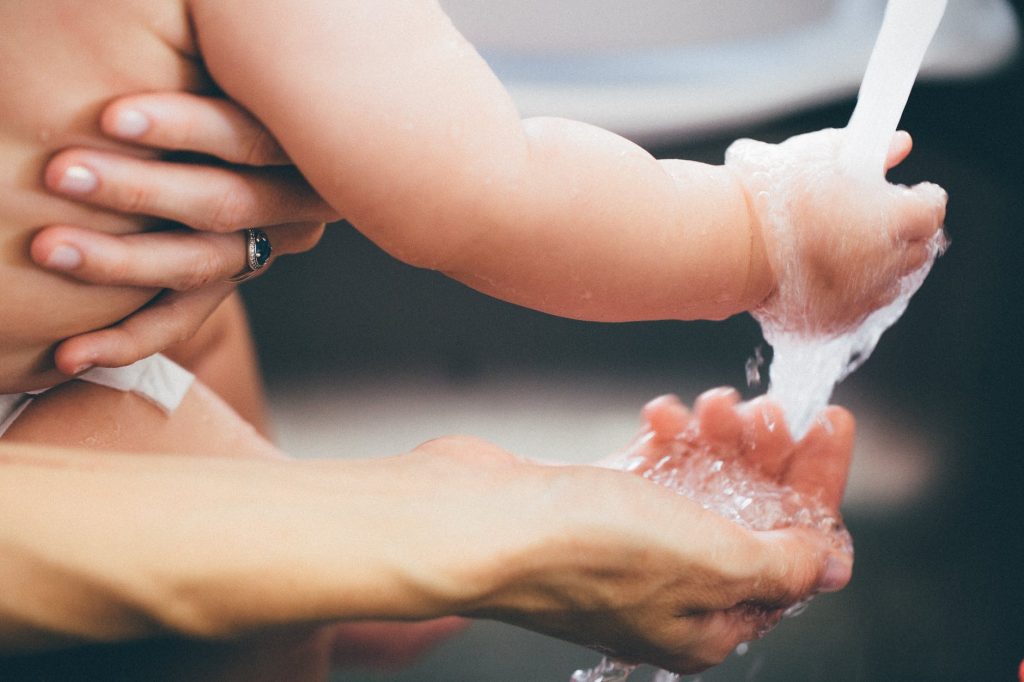
It might seem obvious or repetitive, but keeping your hands clean is a big part of containing the spread of any virus, most notably, the coronavirus. People can make fun of you for being a clean freak, but clean freaks are the ones that will likely avoid getting the nasty germs that so easily get passed around. It is important to wash your hands for at least 20 seconds, rubbing them together and then rinsing them thoroughly.
The Trump administration has already set aside billions of dollars to combat this virus and stop its spread from infecting people in the future. It’s comforting to know that boots are on the ground and that efforts are being made to minimize the effects of a global outbreak, which is the last thing that anyone wants, especially the US Government.

How Can I Keep My Family Safe From The New Virus?
So, you might be asking yourself, “What are some things I can do at home to keep me and my family safe?” Here’s one for all you introverts: when possible, stay home! If that’s not possible, keep your distance when someone shows signs of illness. It might seem a little extreme, but if your health or the health of your loved ones are on the line, is ANYTHING too extreme?
For example, my kids love playing in public play areas such as the McDonald’s PlayLand or those indoor parks (most of our activities are indoors due to the weather this time of the year), but when we visit those places, almost without fail, my kids get sick. Sure, you could make the argument that ‘they’re just building their immunity‘ (and there’s some truth to that), but ultimately, during this stressful time, it’s better to be safe than sorry.
Pull out those board games. Let the kids do some arts and crafts projects (it’s okay- glitter can be vacuumed up), watch a movie with the family, make a fort, or do something else that keeps the little ones busy. I’m not suggesting you cut off contact with the outside world, but maybe just minimize exposure to play it safe.
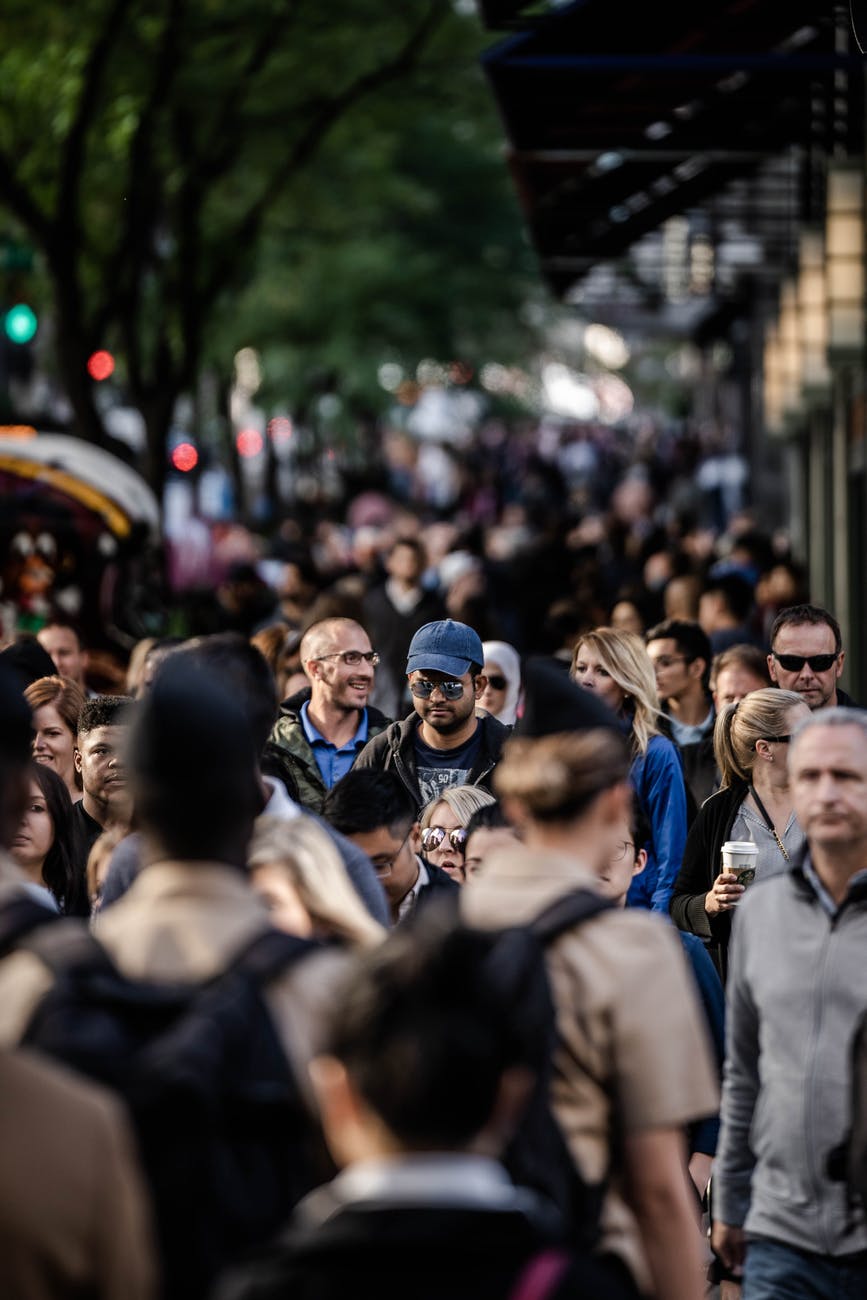
Whether we’re talking about the flu, the common cold, or the new virus, this time of the year is a perfect breeding ground for illnesses, and public places are the perfect places for those germs to be exchanged.
If you are planning on traveling, I would cancel your plans for now. If you are planning on visiting a big place like Disneyland or Disneyworld, here is a great post for you to check out ‘What you need to know about Disney and Viruses‘.
As I mentioned earlier, you may have seen people on the news wearing masks in infected areas. The good news is this: you don’t need to wear a mask to protect yourself from infection. In fact, it’s suggested that you really only need to wear one if you yourself are showing signs of infection.
What Things Should I Have On Hand At Home?
Most face masks just don’t cut it and do little more than placing your hand in front of your mouth. To really protect yourself and others (again, only if you are the one with symptoms), officials suggest using N95-grade masks, which are built to filter out vapor and particles that carry the virus. Normal, cheap face masks found at your local dollar store won’t do anything.
Another wise thing to have on hand in the house is a cold and flu-fighting regimen. Our family adores Airborne and Emergen-C because they build up your immune system when you begin feeling the signs of illness.
Additionally, each house should carry plenty of zinc, which can easily be found in many products in the Zicam line. Zinc helps shorten the length of infection, so Zicam products have helped me get over sicknesses a lot quicker than just waiting it out. And, TAKE YOUR VITAMINS!

As a teacher, I’m constantly bombarded with germs, so these products are my go-to brands to help me make it through the year (because kids are just gross, right?).
Do yourself a favor and buy some antibacterial wipes and some hand sanitizer while you’re at it. Those wipes are a lifesaver, and I use them every day in my classroom to keep things clean. I also make sure that my hand sanitizer isn’t far away because either I or my children will undoubtedly touch things that will require a heavy dose of the stuff.
Know the Signs! Coronavirus Symptom Infographic Made By The College Student First Aid Kit:
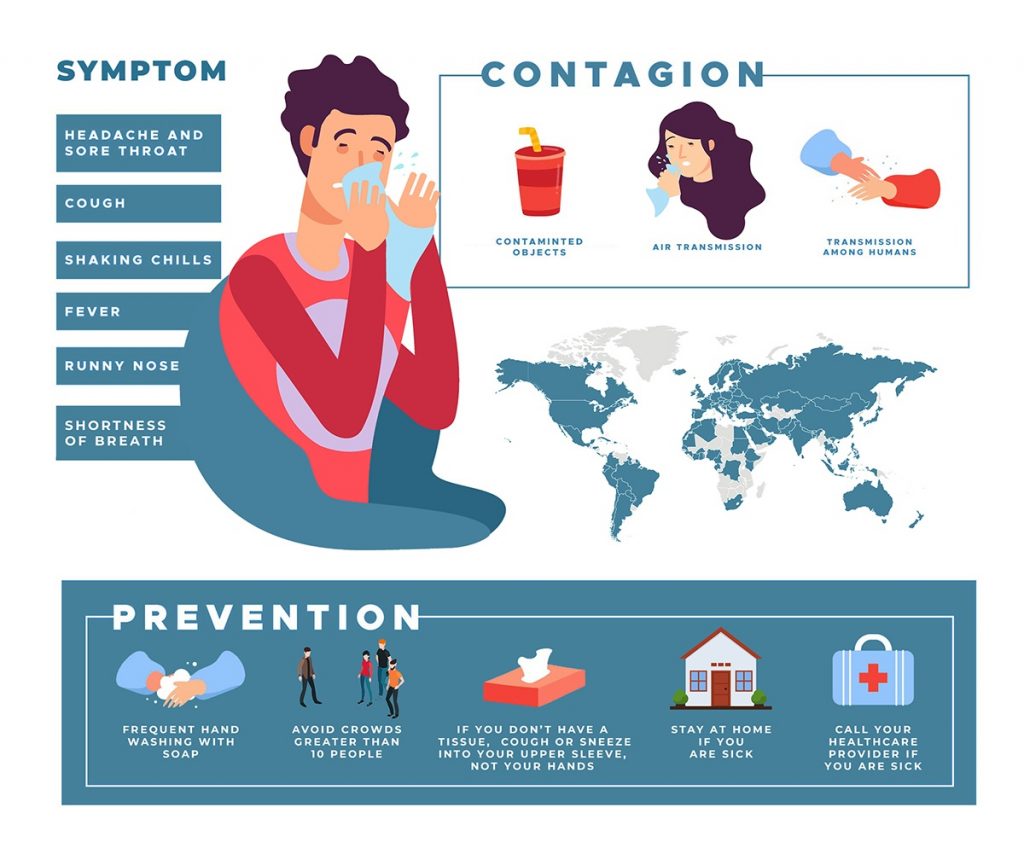
Food Storage
Ultimately, if things do get really bad out there (though it truly is unlikely that it will), it would be wise to have decent food storage. Stock up on a month’s worth (if possible) of canned goods, health products, toiletries, and water.
What You Need To Know About The New Virus: If the virus spreads and becomes deadlier, then staying home would be your best bet- so make it comfortable in case it gets to that point. Don’t forget to snag some family favorites- no one wants to eat canned beans for 30 days.
I know it’s scary seeing the unsettling news of a widespread illness that’s now popping up here in the United States. We’re always concerned when things like this make the news and we want to do all that we can to protect ourselves and our little ones.
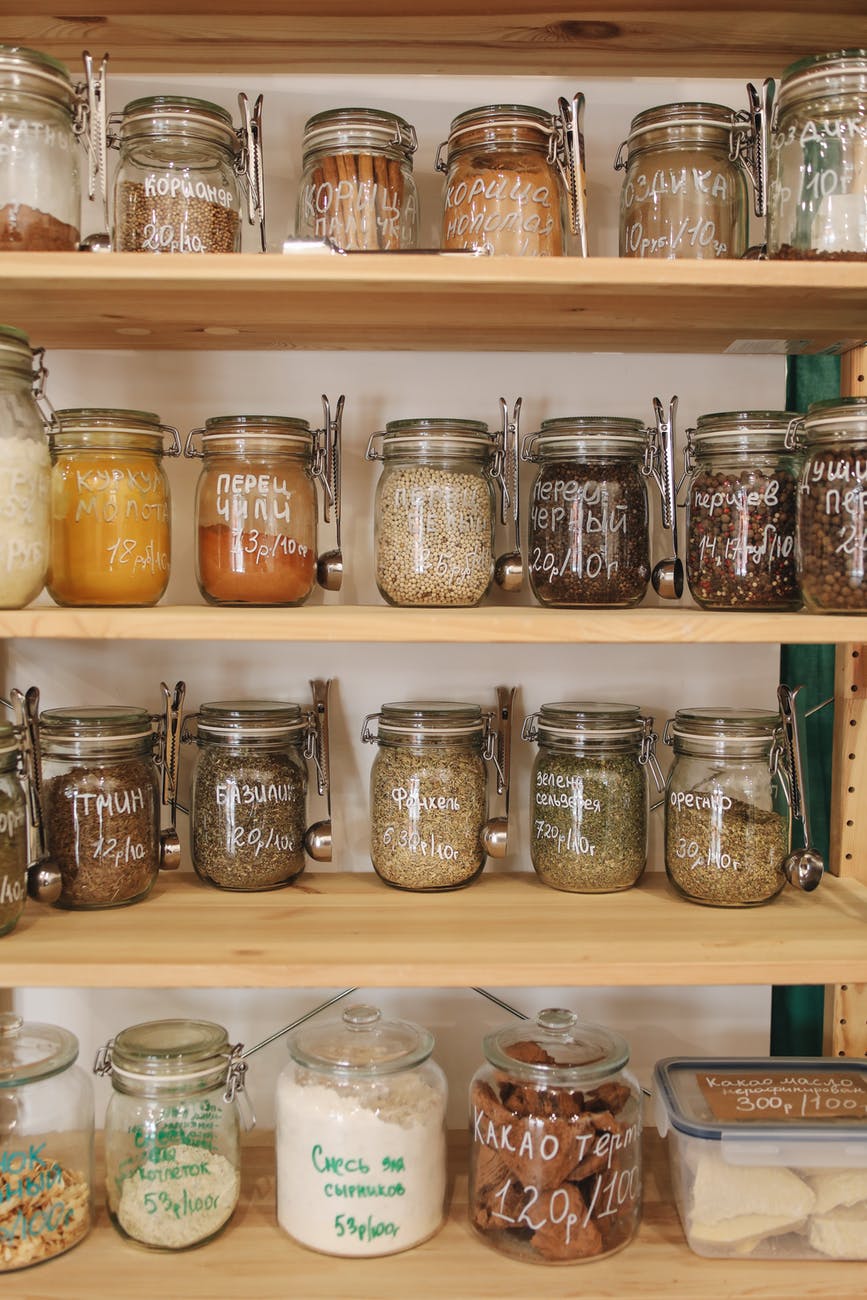
However, we can find comfort in knowing that there are many things that are within our control, so it’s important to do all that we can to protect the ones we love. It’s always better to be safe than sorry.
These are only a few things You Need To Know About The new virus. If you watch the news or check Facebook, you can stay up to date on the latest news. All in all, don’t freak out. People LOVE blowing things like this up and getting everyone scared. Don’t be scared, just take precautionary methods to not get sick! Make sure your pantry has food enough for at least 20 days.
What Is The Difference Between COVID-19 and Influenza?
Here is a helpful infographic from The Visual Communication Guy, that is extremely helpful in knowing the difference between COVID-19 and Influenza:
Do I Have The New Virus Going Around? What are your thoughts on the New Virus? Any tips you want to add?
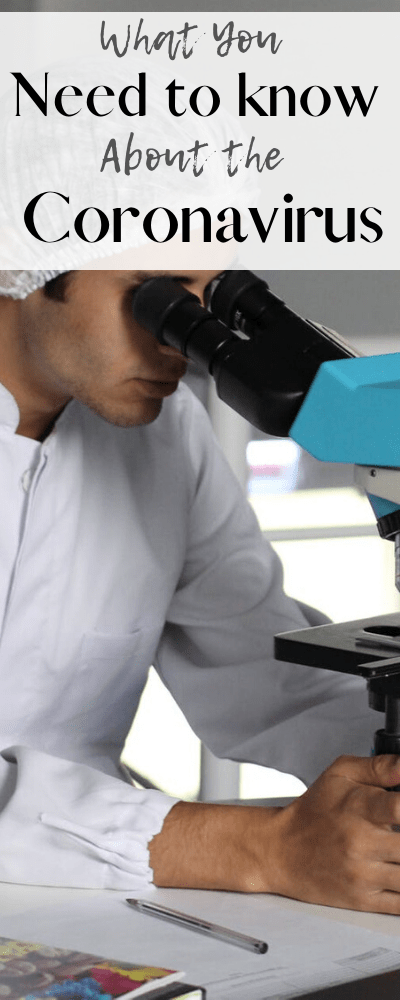

Debi Low says
I learned in Microbiology that washing hands requires much more than a quick run under the water with a little soap like many people do. You have to actively scrub the soap onto your skin, between your fingers, around and under the nail beds, and up to your wrists for a full 20+ seconds to be effective. Those little bacteria and viruses are tough little boogers. The lather helps to trap them so they get rinsed down the sink.
Kim Delatorre says
Very good to know! Thank you!
Brenda says
Great article! I think you are right they are making more out of this than they really need to. Just take the precautions like you stated and you will be fine! If you do get it or someone in your home does take precautions to keep them quarantined so your whole family doesn’t get it, and stay home so you don’t spread it to everyone else.
Kim Delatorre says
Yes! Just take precautions!